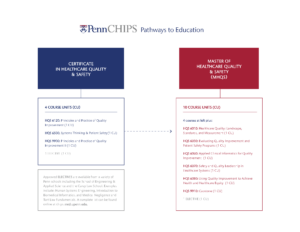Can I work full time and complete the program?
Yes, almost all students work full-time in a healthcare setting. The capstone project requires that students work on a QIPS project in their workplace setting. Students must be working in healthcare to apply to the Certificate program.
How do I manage the course load?
Our students find the course work manageable. Let us know if you’d like to connect with a current student or alumni.
Here are what some of our students say:
“The time in classes was spent thoughtfully. The amount of outside work was manageable.”
“Managing going back to school has been very achievable. I think the work is very manageable outside of the course, and it is enjoyable so it does not feel like it is a lot of work.”
“The program is very flexible, and they will work with you as long as you have the support from your department. There is not a ton of homework to do afterwards so it is completely manageable.”
“The hybrid model of classes is great. I think it is great to have the mix of in-person to meet and connect and also have some flexibility with online courses. I really found that the structure of this program allows me to make progress on goals at work. What has been helpful for me has been to not think about class and work as completely separate, but to consider this program as professional development and as an opportunity to make progress at work.”
“School doesn’t always feel like schoolwork. It feels like work-work as well! All of the faculty and professors in the program do a great job at giving you theory but not giving you busy work.”

